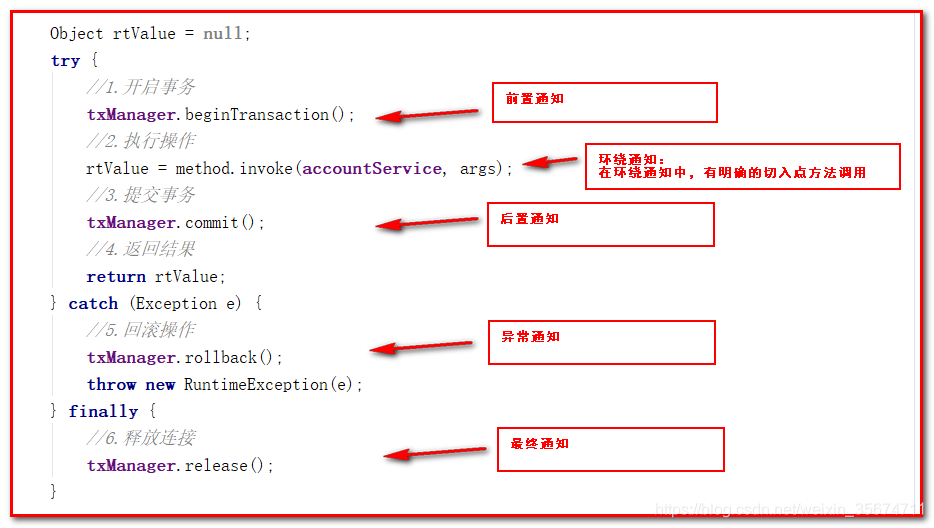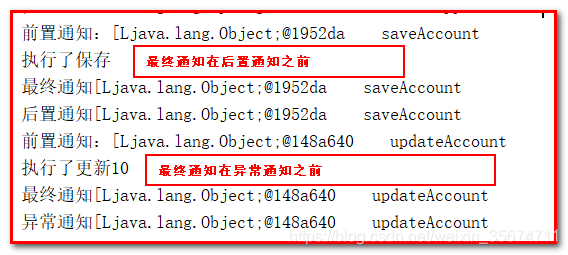Spring中的AOP
Spring中AOP的细节
说明
我们学习spring的aop,就是通过配置的方式(使用JDK代理),实现上一章节的功能。
public class BeanFactory {
private AccountService accountService;
private TransactionManager txManager;
public void setTxManager(TransactionManager txManager) {
this.txManager = txManager;
}
public final void setAccountService(AccountService accountService) {
this.accountService = accountService;
}
/**
* 获取Service代理对象
* @return
*/
public AccountService getAccountService() {
return (AccountService)Proxy.newProxyInstance(accountService.getClass().getClassLoader(),
accountService.getClass().getInterfaces(),
new InvocationHandler() {
/**
* 添加事务的支持
*
* @param proxy
* @param method
* @param args
* @return
* @throws Throwable
*/
public Object invoke(Object proxy, Method method, Object[] args) throws Throwable {
// 表示测试用的方法
// if("test".equals(method.getName())){
// return method.invoke(accountService,args);
// }
Object rtValue = null;
try {
//1.开启事务
txManager.beginTransaction();
//2.执行操作
rtValue = method.invoke(accountService, args);
//3.提交事务
txManager.commit();
//4.返回结果
return rtValue;
} catch (Exception e) {
//5.回滚操作
txManager.rollback();
throw new RuntimeException(e);
} finally {
//6.释放连接
txManager.release();
}
}
});
}
}
AOP相关术语
Joinpoint(连接点): (方法)
所谓连接点是指那些被拦截到的点。在spring中,这些点指的是方法,因为spring只支持方法类型的连接点。
Pointcut(切入点): (方法)
所谓切入点是指我们要对哪些Joinpoint进行拦截的定义。
Advice(通知/增强): (方法)
所谓通知是指拦截到Joinpoint之后所要做的事情就是通知。
通知的类型:前置通知,后置通知,异常通知,最终通知,环绕通知。
Target(目标对象):
代理的目标对象。
Weaving(织入): (了解)
是指把增强应用到目标对象来创建新的代理对象的过程。
spring采用动态代理织入,而AspectJ采用编译期织入和类装载期织入。
Proxy(代理):
一个类被AOP织入增强后,就产生一个结果代理类。
Aspect(切面): (类)
是切入点和通知(引介)的结合。
Introduction(引介): (不了解)
引介是一种特殊的通知在不修改类代码的前提下, Introduction可以在运行期为类动态地添加一些方法或Field。
学习spring中的AOP要明确的事 (了解)
a、开发阶段(我们做的)
编写核心业务代码(开发主线):大部分程序员来做,要求熟悉业务需求。
把公用代码抽取出来,制作成通知(日志、事务、权限)。开发阶段最后再做。
编写日志、事务、权限的配置,在spring配置文件中,声明切入点与通知间的关系,即切面即可。
b、运行阶段(Spring框架完成的)
Spring框架监控切入点方法的执行。一旦监控到切入点方法被运行,使用代理机制,动态创建目标对象的代理对象,根据通知类别,在代理对象的对应位置,将通知对应的功能织入,完成完整的代码逻辑运行。
关于代理的选择
在spring中,框架会根据目标类是否实现了接口来决定采用哪种动态代理的方式。
如果对接口,默认使用JDK代理。

如果对类,采用CGLIB代理。

Spring的AOP配置
【需求】在访问com.itheima.service.impl中的AccountService.java中的方法之前,添加日志操作
准备工作
第一步:创建spring_day03_springaop工程

第二步:导入maven坐标
<?xml version="1.0" encoding="UTF-8"?>
<project xmlns="http://maven.apache.org/POM/4.0.0"
xmlns:xsi="http://www.w3.org/2001/XMLSchema-instance"
xsi:schemaLocation="http://maven.apache.org/POM/4.0.0 http://maven.apache.org/xsd/maven-4.0.0.xsd">
<modelVersion>4.0.0</modelVersion>
<groupId>com.itheima</groupId>
<artifactId>spring_day03_springaop</artifactId>
<version>1.0-SNAPSHOT</version>
<packaging>jar</packaging>
<dependencies>
<dependency>
<groupId>org.springframework</groupId>
<artifactId>spring-context</artifactId>
<version>5.0.2.RELEASE</version>
</dependency>
<dependency>
<groupId>org.springframework</groupId>
<artifactId>spring-test</artifactId>
<version>5.0.2.RELEASE</version>
</dependency>
<dependency>
<groupId>junit</groupId>
<artifactId>junit</artifactId>
<version>4.12</version>
</dependency>
<dependency>
<groupId>org.aspectj</groupId>
<artifactId>aspectjweaver</artifactId>
<version>1.8.7</version>
</dependency>
</dependencies>
</project>
第三步:定义Service的接口和实现类
创建包com.itheima.service,创建接口AccountService.java
/**
* 账户的业务层接口
*/
public interface AccountService {
/**
* 模拟保存账户
*/
void saveAccount();
/**
* 模拟更新账户
* @param i
*/
void updateAccount(int i);
/**
* 删除账户
* @return
*/
int deleteAccount();
}
创建包com.itheima.service.impl,创建接口的实现类AccountServiceImpl.java
/**
* 账户的业务层实现类
*/
public class AccountServiceImpl implements AccountService {
public void saveAccount() {
System.out.println("执行了保存");
}
public void updateAccount(int i) {
System.out.println("执行了更新"+i);
}
public int deleteAccount() {
System.out.println("执行了删除");
return 0;
}
}
第四步:创建com.itheima.util,创建增强类Logger.java
/**
* 用于记录日志的工具类,它里面提供了公共的代码
*/
public class Logger {
/**
* 用于打印日志:计划让其在切入点方法执行之前执行(切入点方法就是业务层方法)
*/
public void printLog(){
System.out.println("Logger类中的pringLog方法开始记录日志了。。。");
}
}
第五步:配置applicationContext.xml
<?xml version="1.0" encoding="UTF-8"?>
<beans xmlns="http://www.springframework.org/schema/beans"
xmlns:xsi="http://www.w3.org/2001/XMLSchema-instance"
xmlns:aop="http://www.springframework.org/schema/aop"
xsi:schemaLocation="http://www.springframework.org/schema/beans
http://www.springframework.org/schema/beans/spring-beans.xsd
http://www.springframework.org/schema/aop
http://www.springframework.org/schema/aop/spring-aop.xsd">
<!-- 配置srping的Ioc,把service对象配置进来-->
<bean id="accountService" class="com.itheima.service.impl.AccountServiceImpl"></bean>
<!--spring中基于XML的AOP配置步骤
1、把通知Bean也交给spring来管理
2、使用aop:config标签表明开始AOP的配置
3、使用aop:aspect标签表明配置切面
id属性:是给切面提供一个唯一标识
ref属性:是指定通知类bean的Id。
4、在aop:aspect标签的内部使用对应标签来配置通知的类型
我们现在示例是让printLog方法在切入点方法执行之前执行:所以是前置通知
aop:before:表示配置前置通知
method属性:用于指定Logger类中哪个方法是前置通知
pointcut属性:用于指定切入点表达式,该表达式的含义指的是对业务层中哪些方法增强
切入点表达式的写法:
关键字:execution(表达式)
-->
<!-- 配置Logger类,声明切面(创建对象,不是真正aop的切面) -->
<bean id="logger" class="com.itheima.utils.Logger"></bean>
<!--配置AOP-->
<aop:config>
<!--配置切面 -->
<aop:aspect id="logAdvice" ref="logger">
<!-- 配置通知的类型,并且建立通知方法和切入点方法的关联-->
<aop:before method="printLog" pointcut="execution(void com.itheima.service.impl.AccountServiceImpl.saveAccount())"></aop:before>
<aop:before method="printLog" pointcut="execution(void com.itheima.service.impl.AccountServiceImpl.updateAccount(int))"></aop:before>
<aop:before method="printLog" pointcut="execution(int com.itheima.service.impl.AccountServiceImpl.deleteAccount())"></aop:before>
</aop:aspect>
</aop:config>
</beans>
第六步:测试
创建com.itheim.test包,创建测试类AOPTest.java
/**
* 测试AOP的配置
*/
@RunWith(value = SpringJUnit4ClassRunner.class)
@ContextConfiguration(locations = "classpath:applicationContext.xml")
public class AOPTest {
@Autowired
private AccountService as;
@Test
public void proxy(){
//3.执行方法
as.saveAccount();
as.updateAccount(1);
as.deleteAccount();
}
}
实现了在访问目标对象方法之前先输出了日志。(切面编程)
切入点表达式的写法(重点)
切入点表达式的写法
关键字:execution(表达式)
表达式:
参数一:访问修饰符(非必填)
参数二:返回值(必填)
参数三:包名.类名(非必填)
参数四:方法名(参数)(必填)
参数五:异常(非必填)
访问修饰符 返回值 包名.包名.包名...类名.方法名(参数列表)
标准的表达式写法:
public void com.itheima.service.impl.AccountServiceImpl.saveAccount()
访问修饰符可以省略
void com.itheima.service.impl.AccountServiceImpl.saveAccount()
返回值可以使用通配符(*:表示任意),表示任意返回值
* com.itheima.service.impl.AccountServiceImpl.saveAccount()
包名可以使用通配符,表示任意包。但是有几级包,就需要写几个*.
* *.*.*.*.AccountServiceImpl.saveAccount())
包名可以使用..表示当前包及其子包
* *..AccountServiceImpl.saveAccount()
类名和方法名都可以使用*来实现通配(一般情况下,不会这样配置)
* *..*.*() == * *()
参数列表:
可以直接写数据类型:
基本类型直接写名称 int
引用类型写包名.类名的方式 java.lang.String
可以使用通配符表示任意类型,但是必须有参数
可以使用..表示有无参数均可,有参数可以是任意类型
全通配写法:* *..*.*(..)
实际开发中切入点表达式的通常写法:切到业务层实现类下的所有方法:* com.itheima.service..*.*(..)
例如:
<aop:before method="printLog" pointcut="execution(* com.itheima.service..*.*(..))">
</aop:before>
Spring AOP的五种通知类型(使用XML)
前置通知、后置通知、异常通知、最终通知、环绕通知。

准备工作
第一步:创建工程

第二步:配置pom.xml
<?xml version="1.0" encoding="UTF-8"?>
<project xmlns="http://maven.apache.org/POM/4.0.0"
xmlns:xsi="http://www.w3.org/2001/XMLSchema-instance"
xsi:schemaLocation="http://maven.apache.org/POM/4.0.0 http://maven.apache.org/xsd/maven-4.0.0.xsd">
<modelVersion>4.0.0</modelVersion>
<groupId>com.itheima</groupId>
<artifactId>spring_day03_adviceType</artifactId>
<version>1.0-SNAPSHOT</version>
<packaging>jar</packaging>
<dependencies>
<dependency>
<groupId>org.springframework</groupId>
<artifactId>spring-context</artifactId>
<version>5.0.2.RELEASE</version>
</dependency>
<dependency>
<groupId>org.springframework</groupId>
<artifactId>spring-test</artifactId>
<version>5.0.2.RELEASE</version>
</dependency>
<dependency>
<groupId>junit</groupId>
<artifactId>junit</artifactId>
<version>4.12</version>
</dependency>
<dependency>
<groupId>org.aspectj</groupId>
<artifactId>aspectjweaver</artifactId>
<version>1.8.7</version>
</dependency>
</dependencies>
</project>
第三步:定义Service的接口和实现类
创建包com.itheima.service,创建接口AccountService.java
/**
* 账户的业务层接口
*/
public interface AccountService {
/**
* 模拟保存账户
*/
void saveAccount();
/**
* 模拟更新账户
* @param i
*/
void updateAccount(int i);
/**
* 删除账户
* @return
*/
int deleteAccount();
}
创建包com.itheima.service.impl,创建接口的实现类AccountServiceImpl.java
/**
* 账户的业务层实现类
*/
public class AccountServiceImpl implements AccountService {
public void saveAccount() {
System.out.println("执行了保存");
}
public void updateAccount(int i) {
System.out.println("执行了更新"+i);
}
public int deleteAccount() {
System.out.println("执行了删除");
return 0;
}
}
第四步:创建com.itheima.util,创建增强类Logger.java
/**
* 用于记录日志的工具类,它里面提供了公共的代码
*/
public class Logger {
/**
* 前置通知
*/
public void beforePrintLog(JoinPoint jp){
System.out.println("前置通知Logger类中的beforePrintLog方法开始记录日志了。。。");
}
/**
* 后置通知
*/
public void afterReturningPrintLog(JoinPoint jp){
System.out.println("后置通知Logger类中的afterReturningPrintLog方法开始记录日志了。。。");
}
/**
* 异常通知
*/
public void afterThrowingPrintLog(JoinPoint jp){
System.out.println("异常通知Logger类中的afterThrowingPrintLog方法开始记录日志了。。。");
}
/**
* 最终通知
*/
public void afterPrintLog(JoinPoint jp){
System.out.println("最终通知Logger类中的afterPrintLog方法开始记录日志了。。。");
}
/**
* 环绕通知
* 问题:
* 当我们配置了环绕通知之后,切入点方法没有执行,而通知方法执行了。
* 分析:
* 通过对比动态代理中的环绕通知代码,发现动态代理的环绕通知有明确的切入点方法调用,而我们的代码中没有。
* 解决:
* Spring框架为我们提供了一个接口:ProceedingJoinPoint。该接口有一个方法proceed(),此方法就相当于明确调用切入点方法。
* 该接口可以作为环绕通知的方法参数,在程序执行时,spring框架会为我们提供该接口的实现类供我们使用。
*
* spring中的环绕通知:
* 它是spring框架为我们提供的一种可以在代码中手动控制增强方法何时执行的方式。
*/
public Object aroundPringLog(ProceedingJoinPoint pjp){
Object rtValue = null;
try{
Object[] args = pjp.getArgs();//得到方法执行所需的参数
System.out.println("Logger类中的aroundPringLog方法开始记录日志了。。。前置");
rtValue = pjp.proceed(args);//明确调用业务层方法(切入点方法)
System.out.println("Logger类中的aroundPringLog方法开始记录日志了。。。后置");
return rtValue;
}catch (Throwable t){
System.out.println("Logger类中的aroundPringLog方法开始记录日志了。。。异常");
throw new RuntimeException(t);
}finally {
System.out.println("Logger类中的aroundPringLog方法开始记录日志了。。。最终");
}
}
}
第五步:配置applicationContext.xml
<?xml version="1.0" encoding="UTF-8"?>
<beans xmlns="http://www.springframework.org/schema/beans"
xmlns:xsi="http://www.w3.org/2001/XMLSchema-instance"
xmlns:aop="http://www.springframework.org/schema/aop"
xsi:schemaLocation="http://www.springframework.org/schema/beans
http://www.springframework.org/schema/beans/spring-beans.xsd
http://www.springframework.org/schema/aop
http://www.springframework.org/schema/aop/spring-aop.xsd">
<!-- 配置srping的Ioc,把service对象配置进来-->
<bean id="accountService" class="com.itheima.service.impl.AccountServiceImpl"></bean>
<!-- 配置Logger类 -->
<bean id="logger" class="com.itheima.utils.Logger"></bean>
<!--配置AOP-->
<aop:config>
<!-- 配置切入点表达式 id属性用于指定表达式的唯一标识。expression属性用于指定表达式内容
此标签写在aop:aspect标签内部只能当前切面使用。
它还可以写在aop:aspect外面,此时就变成了所有切面可用
-->
<aop:pointcut id="pt1" expression="execution(* com.itheima.service..*.*(..))"></aop:pointcut>
<!--配置切面 -->
<aop:aspect id="logAdvice" ref="logger">
<!-- 配置前置通知:在切入点方法执行之前执行
<aop:before method="beforePrintLog" pointcut-ref="pt1" ></aop:before>-->
<!-- 配置后置通知:在切入点方法正常执行之后值。它和异常通知永远只能执行一个
<aop:after-returning method="afterReturningPrintLog" pointcut-ref="pt1"></aop:after-returning>-->
<!-- 配置异常通知:在切入点方法执行产生异常之后执行。它和后置通知永远只能执行一个
<aop:after-throwing method="afterThrowingPrintLog" pointcut-ref="pt1"></aop:after-throwing>-->
<!-- 配置最终通知:无论切入点方法是否正常执行它都会在其后面执行
<aop:after method="afterPrintLog" pointcut-ref="pt1"></aop:after>-->
<!-- 配置环绕通知 详细的注释请看Logger类中-->
<aop:around method="aroundPringLog" pointcut-ref="pt1"></aop:around>
</aop:aspect>
</aop:config>
</beans>
第六步:测试类
/**
* 测试AOP的配置
*/
@RunWith(value = SpringJUnit4ClassRunner.class)
@ContextConfiguration(locations = "classpath:applicationContext.xml")
public class AOPTest {
@Autowired
private AccountService as;
@Test
public void proxy(){
//3.执行方法
as.saveAccount();
}
}
Spring AOP的注解方式配置五种通知类型
准备工作
第一步:创建工程

第二步:配置pom.xml
<?xml version="1.0" encoding="UTF-8"?>
<project xmlns="http://maven.apache.org/POM/4.0.0"
xmlns:xsi="http://www.w3.org/2001/XMLSchema-instance"
xsi:schemaLocation="http://maven.apache.org/POM/4.0.0 http://maven.apache.org/xsd/maven-4.0.0.xsd">
<modelVersion>4.0.0</modelVersion>
<groupId>com.itheima</groupId>
<artifactId>spring_day03_annotationaop</artifactId>
<version>1.0-SNAPSHOT</version>
<packaging>jar</packaging>
<dependencies>
<dependency>
<groupId>org.springframework</groupId>
<artifactId>spring-context</artifactId>
<version>5.0.2.RELEASE</version>
</dependency>
<dependency>
<groupId>org.springframework</groupId>
<artifactId>spring-test</artifactId>
<version>5.0.2.RELEASE</version>
</dependency>
<dependency>
<groupId>junit</groupId>
<artifactId>junit</artifactId>
<version>4.12</version>
</dependency>
<dependency>
<groupId>org.aspectj</groupId>
<artifactId>aspectjweaver</artifactId>
<version>1.8.7</version>
</dependency>
</dependencies>
</project>
第三步:定义Service的接口和实现类
创建包com.itheima.service,创建接口AccountService.java
/**
* 账户的业务层接口
*/
public interface AccountService {
/**
* 模拟保存账户
*/
void saveAccount();
/**
* 模拟更新账户
* @param i
*/
void updateAccount(int i);
/**
* 删除账户
* @return
*/
int deleteAccount();
}
创建包com.itheima.service.impl,创建接口的实现类AccountServiceImpl.java
/**
* 账户的业务层实现类
*/
@Service("accountService")
public class AccountServiceImpl implements AccountService {
public void saveAccount() {
System.out.println("执行了保存");
//int i=1/0;
}
public void updateAccount(int i) {
System.out.println("执行了更新"+i);
}
public int deleteAccount() {
System.out.println("执行了删除");
return 0;
}
}
第四步:创建com.itheima.util,创建增强类Logger.java
/**
* 用于记录日志的工具类,它里面提供了公共的代码
*/
@Component("logger")
@Aspect//表示当前类是一个切面类
public class Logger {
@Pointcut("execution(* com.itheima.service..*.*(..))")
private void pt1(){}
/**
* 前置通知
*/
// @Before("pt1()")
public void beforePrintLog(JoinPoint jp){
System.out.println("前置通知Logger类中的beforePrintLog方法开始记录日志了。。。");
}
/**
* 后置通知
*/
// @AfterReturning("pt1()")
public void afterReturningPrintLog(JoinPoint jp){
System.out.println("后置通知Logger类中的afterReturningPrintLog方法开始记录日志了。。。");
}
/**
* 异常通知
*/
// @AfterThrowing("pt1()")
public void afterThrowingPrintLog(JoinPoint jp){
System.out.println("异常通知Logger类中的afterThrowingPrintLog方法开始记录日志了。。。");
}
/**
* 最终通知
*/
// @After("pt1()")
public void afterPrintLog(JoinPoint jp){
System.out.println("最终通知Logger类中的afterPrintLog方法开始记录日志了。。。");
}
/**
* 环绕通知
* 问题:
* 当我们配置了环绕通知之后,切入点方法没有执行,而通知方法执行了。
* 分析:
* 通过对比动态代理中的环绕通知代码,发现动态代理的环绕通知有明确的切入点方法调用,而我们的代码中没有。
* 解决:
* Spring框架为我们提供了一个接口:ProceedingJoinPoint。该接口有一个方法proceed(),此方法就相当于明确调用切入点方法。
* 该接口可以作为环绕通知的方法参数,在程序执行时,spring框架会为我们提供该接口的实现类供我们使用。
*
* spring中的环绕通知:
* 它是spring框架为我们提供的一种可以在代码中手动控制增强方法何时执行的方式。
*/
@Around("pt1()")
public Object aroundPringLog(ProceedingJoinPoint pjp){
Object rtValue = null;
try{
Object[] args = pjp.getArgs();//得到方法执行所需的参数
System.out.println("Logger类中的aroundPringLog方法开始记录日志了。。。前置");
rtValue = pjp.proceed(args);//明确调用业务层方法(切入点方法)
System.out.println("Logger类中的aroundPringLog方法开始记录日志了。。。后置");
return rtValue;
}catch (Throwable t){
System.out.println("Logger类中的aroundPringLog方法开始记录日志了。。。异常");
throw new RuntimeException(t);
}finally {
System.out.println("Logger类中的aroundPringLog方法开始记录日志了。。。最终");
}
}
}
第五步:配置applicationContext.xml
<?xml version="1.0" encoding="UTF-8"?>
<beans xmlns="http://www.springframework.org/schema/beans"
xmlns:xsi="http://www.w3.org/2001/XMLSchema-instance"
xmlns:aop="http://www.springframework.org/schema/aop"
xmlns:context="http://www.springframework.org/schema/context"
xsi:schemaLocation="http://www.springframework.org/schema/beans
http://www.springframework.org/schema/beans/spring-beans.xsd
http://www.springframework.org/schema/aop
http://www.springframework.org/schema/aop/spring-aop.xsd
http://www.springframework.org/schema/context
http://www.springframework.org/schema/context/spring-context.xsd">
<!-- 配置spring创建容器时要扫描的包-->
<context:component-scan base-package="com.itheima"></context:component-scan>
<!-- 配置spring开启注解AOP的支持 -->
<aop:aspectj-autoproxy></aop:aspectj-autoproxy>
</beans>
第六步:测试类
/**
* 测试AOP的配置
*/
@RunWith(value = SpringJUnit4ClassRunner.class)
@ContextConfiguration(locations = "classpath:applicationContext.xml")
public class AOPTest {
@Autowired
private AccountService as;
@Test
public void proxy(){
//3.执行方法
as.saveAccount();
}
}
总结:
发现问题:注解开发spring的aop,默认是:最终通知放置到了后置通知/异常通知的前面。要想实现最终通知放置到后置通知/异常通知的后面,怎么办?
解决方案:只能使用环绕通知。

完全使用注解(了解)
第一步:去掉applicationContext.xml
创建包com.itheima.config,创建类SpringConfiguration.java
@Configuration
@ComponentScan(basePackages="com.itheima")
@EnableAspectJAutoProxy
public class SpringConfiguration {
}
第二步:测试类,AOPAnnoTest.java
/**
* 测试AOP的配置
*/
@RunWith(value = SpringJUnit4ClassRunner.class)
@ContextConfiguration(classes = SpringConfiguration.class)
public class AOPAnnoTest {
@Autowired
private AccountService as;
@Test
public void proxy(){
//3.执行方法
as.saveAccount();
}
}





















 19
19

 被折叠的 条评论
为什么被折叠?
被折叠的 条评论
为什么被折叠?








